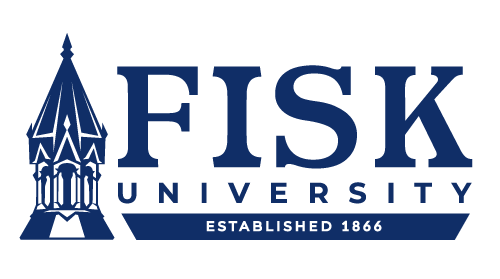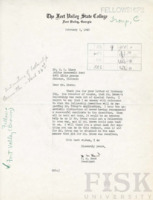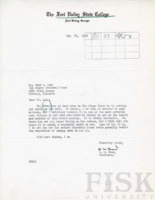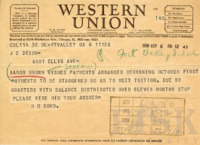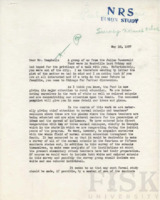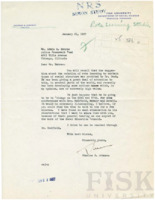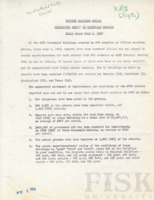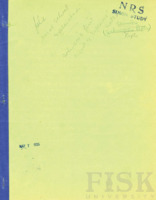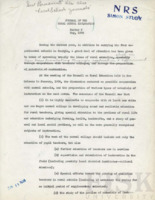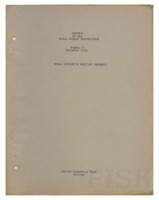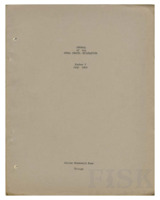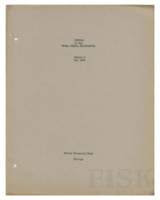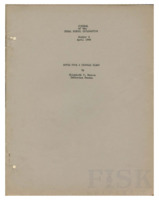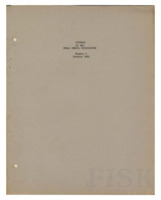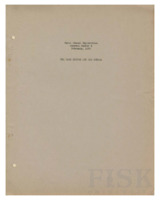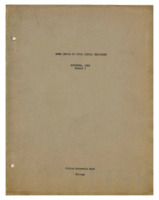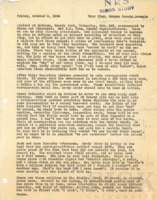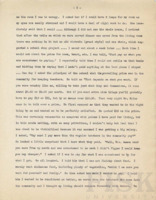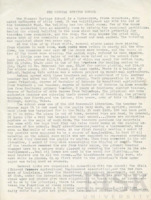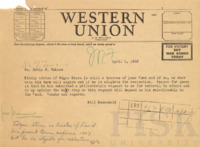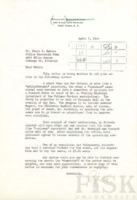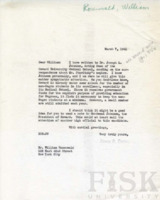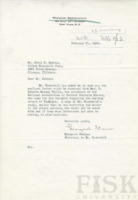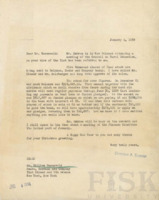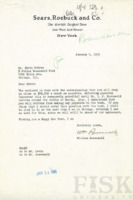Browse Items
SORT
Cornelius Vanderbilt Troup Fellowship Correspondence and Grant Records, 1940 - 1941
This collection includes letter correspondence, checks, and payment records concerning Cornelius Vanderbilt Troup's fellowship. Key individuals include Dr. Horace Mann Bond, Mr. J.C. Dixon, Dorothy Elvidge, and Edwin R. Embree. The materials document the approval and disbursement of a $2,000 grant, with an additional $300 awarded, enabling Mr. Troup to study under Dr. Nelson L. Bossing at the University of Minnesota.
The collection also contains Mr. Troup's fellowship application documents, a detailed plan of work, and recommendation letters from W.A. Robinson, Miss Hattie V. Feger, and Dr. Horace Mann Bond.
Lawrence A. Jones Fellowship Correspondence and Financial Records, 1941–1942
This collection comprises correspondence, checks, and payment records related to Lawrence A. Jones, a faculty member at Fort Valley State College in Georgia. Key individuals include Dr. H.M. Bond, Fred G. Wale, Dorothy Elvidge, William C. Haygood, and Robert C. Smith. The documents detail the approval and disbursement of an $800 expenditure for Mr. Jones to pursue studies in Mexico from July 1941 to January 1942.
Aaron J. Brown Fellowship and Dissertation Correspondence, 1939–1942
This collection features correspondence, checks, and payment records related to Aaron J. Brown, a faculty member at Fort Valley State College in Georgia, during his fellowship to study at the University of Chicago from 1939 to 1940. Key figures in the correspondence include Dr. Horace M. Bond, Dr. J.C. Dixon, Miss Dorothy A. Elvidge, and Mr. Fred G. Wale. The materials document checks received by Mr. Brown throughout his fellowship.
Additionally, the collection includes letters involving these individuals and John Dale Russell, a professor of education at the University of Chicago, concerning a $200 grant awarded in 1942. This grant supported Mr. Brown’s travel plans to visit high schools for research related to his doctoral dissertation proposal, conducted under R.W. Tyler.
Correspondence on a Southern Study of Rural Teacher Training
This collection contains letters and meeting notes about a planned study on how rural and elementary teachers are trained in the South. The project was organized by the Julius Rosenwald Fund, with Dr. Doak Campbell from George Peabody College set to lead it. The idea was to take a close look at normal schools, figure out what makes a good rural school and teacher, and then use that to shape better teacher preparation. The letters go over funding, possible team members, and the suggestion to focus on a few key states or regions. There’s also an emphasis on working with both Black and white educators and grounding the project in Southern institutions.
Rote Learning in Southern Rural Schools
This collection contains documents and correspondence centered on a study of rote learning in rural Black schools, led by Charles S. Johnson and Robert E. Park at Fisk University. It includes letters and a long memo from Park, where he reflects on how students often memorize without really understanding, especially when lessons don’t connect to their lives. He talks about how this pattern is tied to history, lack of books, and a gap between school and community. Park suggests trying something different: a school that works with the whole community, focuses on real issues like public health, uses local news and film to spark interest, and makes learning more about thinking than repeating.
In-Depth Report on Rural School and Community Work in Fitzhugh, Arkansas
This collection contains report by John Gammon Jr. on the Fitzhugh Community in Arkansas, where he worked as a vocational agriculture teacher. It describes the makeup of the community, the condition of homes, and how six small schools were combined into one. Gammon outlines his five-year plan to improve things like sanitation, home gardens, poultry, and school attendance. He talks about the progress made through evening classes, canning clubs, and a poultry association that served both Black and white families. He also discusses the resistance he faced from local preachers, the limits put on students by their families and landlords, and the need for more teachers and better coordination within the school.
Digest of the First Diaries of the Explorers
This collection contains a journal summarizing the first field reports from rural school explorers, who recorded daily life in Southern Black communities. It captures local customs, superstitions, family roles, school attitudes, and community tensions. The entries come from places like Fair Play and Red Oak in Georgia, Pine Bluff in Arkansas, and Washington Parish in Louisiana. Observations cover how people talk, what they value, what divides or unites them, and how schools fit into their lives. There are also notes on teacher quality, church influence, and hopes or confusion about help from the Rosenwald Fund.
Journal of the Rural School Exploration Number 9
This collection contains Volume 9 of Journal of the Rural School Exploration. The journal documents efforts to expand rural education through collaboration with teacher colleges and the development of instructional materials. It reports on discussions at the Council on Rural Education in New Orleans, recommending cooperation with both white and Black normal schools, beginning with South Georgia Teachers College. They had plans of adding departments in agriculture, industrial arts, rural sociology, health, and reading, and using demonstration schools for field training. There were plans and efforts to develop appropriate reading materials for rural children, including new books written by authors like Winifred Wise and Arna Bontemps.
Journal of the Rural School Exploration Number 8
This collection contains Volume 8 of Journal of the Rural School Exploration. The journal provides an in-depth study of rural schools in British Columbia, covering the region’s geography, history, and school system. It describes the development of public education from the days of the Hudson Bay Company to a government-supported system.The journal details the province’s health initiatives in schools, including annual medical exams, trained public health nurses, and a unified health service. There was also an experimental centralization program in the Peace River District, led by Inspector W. Plenderleith, which united multiple schools under one official trustee. The report was now concluded with recommendations to extend this centralized model across the entire province.
Journal of the Rural School Exploration Number 7
This collection contains Volume 7 of Journal of the Rural School Exploration. The journal includes a historical account of the Penn School on St. Helena Island, South Carolina, tracing its origins to federal efforts in 1862 to rehabilitate freed slaves through supervised agriculture and education. It details the early challenges of transitioning from slavery to wage labor, the establishment of schools by northern missionaries, and the evolution of Penn School from repetitive academic instruction to practical training in farming, carpentry, and home economics.
Journal of the Rural School Exploration Number 5-6
This collection contains Volumes 5 & 6 of Journal of the Rural School Exploration. The journals include reports from the third Council on Rural Education meeting in Nashville, Tennessee, the training of rural teachers through summer schools for African American educators, and firsthand field accounts from explorers working in communities such as Fitzhugh (Arkansas), Red Oak and Fair Play (Georgia), and Mineral Springs (Louisiana). There is also a report on curriculum development in Southern states and experiments in reading education. Number 6 features a detailed study of rural schools in New Mexico and their efforts to integrate Spanish cultural heritage into school life.
Journal of the Rural School Exploration Number 4
This collection contains Volume 4 of Journal of the Rural School Exploration. This includes notes from a Georgia diary written by Elizabeth P. Cannon and cathering Duncan
Journal of the Rural School Exploration Number 2, 1935
This collection contains Volume 2 of Journal of the Rural School Exploration. This mentions where the members of the rural school exploration have been stationed in the South.
Journal of the Rural School Exploration Number 3
This collection contains Volume 3 of Journal of the Rural School Exploration. This includes a document talking about how the farm system in the rural south.
Newsletter to the Rural School Explorers Numer 1
This collection contains Volume 1 of a journal - Newsletter to Rural School Explorers. This includes excerpts from letters by Buford H. Junker, Harvey Purifoy, Estelle Massey Riddle, and many more.
Several Volumes of Newsletters to Rural School Explorers
This collection contains report by John Wilson on the school at Morgan County, GA. Written in 1934. The report contains reports on the day to day activities of the author, information about the school, various churches, finances for school projects, and adult classes. There was also information about various individuals in the community. Written as a part of the Simon Study.
Report on the Mineral Springs Community
This collection contains description of the Mineral Springs School and a report written by Estelle Massey-Riddle, written in Ouachita Parish, Louisiana in 1934. It includes a description of the community, various observations about the community (the public health in the community among other things), in-depth information on various individuals in the community, and some travel information of the writer. Written as a part of the Simon Study.
Rural School Exploration Report of Estelle Massey-Riddle at Mineral Springs School, Ouachita Parish
This collection contains description of the Mineral Springs School and a report written by Estelle Massey-Riddle, written in Ouachita Parish, Louisiana in 1934. It includes information such as the description of the school, information on various classes, teachers, and some finances of the school . It also included a description of the community, various observations about the community (the public health in the community among other things), in-depth information on various individuals in the community, and some travel information of the writer. Written as a part of the Simon Study.
Fund applications and court documents
Correspondence letters between Edwin R. Embree, Frank Garson, Harry J. Carman, Mrs Herman Alofsin, Nathan Straus, Armand May, Helen Douglas Mankin, Thomas W. Patrick, and William Rosenwald about college scholarship funding for negro students, fund proposal documents from Provident hospital, and court documents stating a notice of election contest for Helen Douglas Mankin vs James C. Davis.
Study of Education for children of Migratory Agricultural Laborers
Correspondence letters between Edwin R. Embree, Albert Abrahamson, Amber Arthun Warburton, Howard A. Dawson, and William Rosenwald about a fund proposal for a project on the study of Education of Migratory Children in the Cotton Belt, document about the work and welfare of children of Agricultural laborers.
Negro Education and Rosenwald Fund Administrative ventures
Correspondence letters between Edwin R. Embree, Margaret Steiner, F. D. Patterson, Harold U. Ribalow, Shirley Fuchs, Julia Waxman, and William Rosenwald, about administrative updates from Howard and Tuskeegee university, fund proposal and denial, and more philantropic interests. Documents also include Trustees of the Rosenwald Fund, a tribute to Bishop Charles L. Russell, and a list of trustees from the fund that Mr William Rosenwald was sending christmas cards to.
The Julius Rosenwald Fund philantropies and board of Trustees
Correspondence letters between Edwin R. Embree, Margaret Steiner, Rosalia M. Johnson, Julia Waxman, and William Rosenwald, about Negro education, philantropic interests for the Rosenwald fund, meetings with the Trustees of the Rosenwald Fund, and a document showing a list of trustees of the Rosenwald Fund.
The Julius Rosenwald Fund organizaional activities
Correspondence letters between Edwin R. Embree, Eleanor Saymon, and William Rosenwald, about contributing to school repairs and beautification. Documents also include; a memorandum of conversations, meetings with trustees, and list of trustees of the fund.
The Julius Rosenwald Fund organizaional activities
Correspondence letters between Edwin R. Embree, and William Rosenwald, about the philantropic initiatives of the Julius Rosenwald Fund, financial activities and other organizational activities . Documents include a list of the board of trustees of the Julius Rosenwald Fund, and cash receipts.
Financial activities, Race relations and Jewish Federations
Correspondence letters between Edwin R. Embree, William Rosenwald, A. T. Malmed, and James G. McDonald, about race relations, Jewish Federatons and the Julius Rosenwald Fund organization financial activities.
